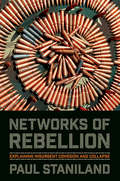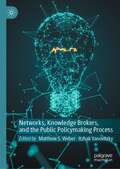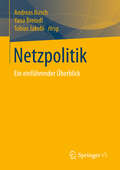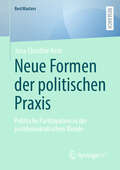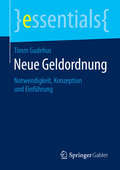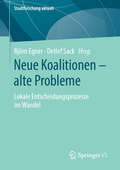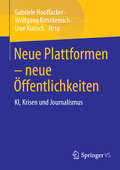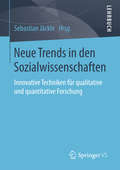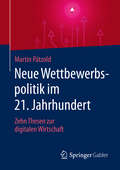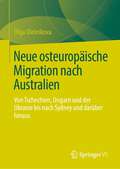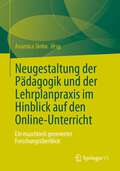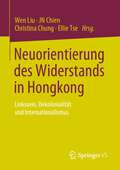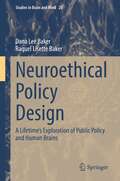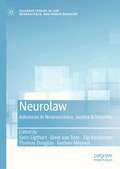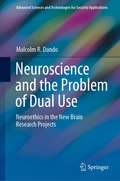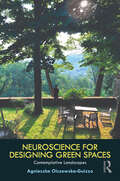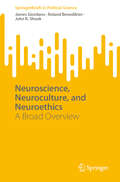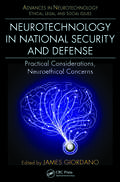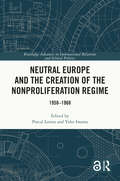- Table View
- List View
Networks of Rebellion: Explaining Insurgent Cohesion and Collapse
by Paul StanilandThe organizational cohesion of insurgent groups is central to explaining patterns of violence, the effectiveness of counterinsurgency, and civil war outcomes. Cohesive insurgent groups produce more effective war-fighting forces and are more credible negotiators; organizational cohesion shapes both the duration of wars and their ultimate resolution. In Networks of Rebellion, Paul Staniland explains why insurgent leaders differ so radically in their ability to build strong organizations and why the cohesion of armed groups changes over time during conflicts. He outlines a new way of thinking about the sources and structure of insurgent groups, distinguishing among integrated, vanguard, parochial, and fragmented groups. Staniland compares insurgent groups, their differing social bases, and how the nature of the coalitions and networks within which these armed groups were built has determined their discipline and internal control. He examines insurgent groups in Afghanistan, 1975 to the present day, Kashmir (1988-2003), Sri Lanka from the 1970s to the defeat of the Tamil Tigers in 2009, and several communist uprisings in Southeast Asia during the Cold War. The initial organization of an insurgent group depends on the position of its leaders in prewar political networks. These social bases shape what leaders can and cannot do when they build a new insurgent group. Counterinsurgency, insurgent strategy, and international intervention can cause organizational change. During war, insurgent groups are embedded in social ties that determine they how they organize, fight, and negotiate; as these ties shift, organizational structure changes as well.
Networks, Knowledge Brokers, and the Public Policymaking Process
by Matthew S. Weber Itzhak YanovitzkySocial network analysis provides a meaningful lens for advancing a more nuanced understanding of the communication networks and practices that bring together policy advocates and practitioners in their day-to-day efforts to broker evidence into policymaking processes. This book advances knowledge brokerage scholarship and methodology as applied to policymaking contexts, focusing on the ways in which knowledge and research are utilized, and go on to influence policy and practice decisions across domains, including communication, health and education. There is a growing recognition that knowledge brokers – key intermediaries – have an important role in calling attention to research evidence that can facilitate the successful implementation of evidence-informed policies and practices. The chapters in this volume focus explicitly on the history of knowledge brokerage research in these contexts and the frameworks and methodologies that bridge these disparate domains. The contributors to this volume offer useful typologies of knowledge brokerage and explicate the range of causal mechanisms that enable knowledge brokers’ influence on policymaking. The work included in this volume responds to this emerging interest by comparing, assessing, and delineating social network approaches to knowledge brokerage across domains. The book is a useful resource for students and scholars of social network analysis and policymaking, including in health, communication, public policy and education policy.
Netzpolitik: Ein einführender Überblick
by Andreas Busch Yana Breindl Tobias JakobiBei der „Netzpolitik“ handelt es sich politisch und akademisch gesehen um ein relativ neues Gebiet, auf dem eine Vielzahl von Themen verhandelt wird. Der vorliegende Band will Orientierung geben, indem er das Feld strukturiert darstellt und zu den wichtigsten Themen fundierte Darstellungen und Analysen vorlegt. Die Beiträge greifen das Thema aus politikwissenschaftlicher Perspektive auf, beziehen es auf Fachdebatten und stellen Material bereit, das sowohl zur Information wie zur Anregung der weiteren Diskussion dienen soll.Der InhaltUntersuchungsgegenstand Internet ● Ein Analyserahmen und die Theoriediskussion zur Netzpolitik in Deutschland ● Internet Governance: Von der Selbstregulierung zu hybriden Regulierungsmodellen ● Der Deutsche Bundestag als Akteur in der Netzpolitik Interessensvermittlung der Internetwirtschaft ● Die digitale Bürgerrechtsbewegung: Akteure, Strategien und Themen ● Modern Times? Das Internet vor dem Bundesverfassungsgericht ● E-Government in Deutschland ● Magna Carta, magna controversia. Ideen, Interessen und Konflikte im Urheberrecht ● Datenschutz im Internet: Akteure, Regulierungspraktiken und Interessenlagen ● Sicherheit im Internet: Cybercrime, Cyberterror und Cyberwar ● Die Regulierung von Online-Inhalten in Deutschland: Zuständigkeit, technische Sperrmöglichkeiten und RegulierungsansätzeDie HerausgeberProf. Dr. Andreas Busch, Dr. Yana Breindl und Dr. Tobias Jakobi, Institut für Politikwissenschaft der Universität Göttingen.
Neue Formen der politischen Praxis: Politische Partizipation in der postdemokratischen Wende (BestMasters)
by Jana Christine KernDas Buch setzt sich mit dem Wandel der politischen Systeme in den letzten Jahren auseinander. Politische Teilhabe wird im Kontext von gesellschaftlichen Dynamiken der Transnationalisierung, Globalisierung als auch Digitalisierung betrachtet. Neue Möglichkeiten der Teilhabe entstehen durch den Einzug von webbasierten Tools in den Alltag. Gleichzeitig werden die Gesellschaftsordnung und somit auch die politischen Aufgabenstellungen immer komplexer und es verbreitet sich eine Politikverdrossenheit oder auch Frustration mit demokratischen Prozessen und Akteur*innen. Wie diese Dynamiken sich auswirken, welche Schwierigkeiten dadurch auftreten und welche Potentiale neue Formen der Partizipation bieten, wird hier erläutert. Die Ausführungen beziehen sich dabei stark auf postdemokratische und Demokratiekrisen-Theorien und die Partizipationskultur in Österreich wird anhand von Regressionsanalysen basierend auf Partizipationsmodellen erforscht. Dabei werden konventionelle Partizipationspraktiken mit unkonventionellen und web-basierten Teilhabeformen verglichen.
Neue Geldordnung: Notwendigkeit, Konzeption und Einführung (essentials)
by Timm GudehusTimm Gudehus begründet in diesem essential die Notwendigkeit einer neuen Geldordnung und beschreibt ihre Vorteile und Chancen. Die Ausführungen sollen dazu anregen, die vorliegenden Vorschläge für eine neue Geldordnung kritisch zu prüfen, bessere Lösungen zu entwickeln, die Einführungsmöglichkeiten zu diskutieren und offene Fragen zu beantworten. Das Werk richtet sich an alle, die verstehen wollen, wie das heutige Geldsystem funktioniert, und die an der Entwicklung und Einführung einer Geldordnung mitwirken möchten, mit der sich die zentralen Probleme des heutigen Geldsystems beheben und die Gefahren unseres Wirtschafts- und Finanzsystems begrenzen lassen.
Neue Koalitionen – alte Probleme: Lokale Entscheidungsprozesse im Wandel (Stadtforschung aktuell)
by Björn Egner Detlef SackIm politischen System der Bundesrepublik zeichnet sich auf der lokalen Ebene seit geraumer Zeit ab, dass sich das Parteiensystem durch den Einzug neuer Parteien in die Kreistage und Räte erweitert hat, während neue Beteiligungsmöglichkeiten politische Mehrheitskonstellationen weniger vorhersehbar machen. In der Folge sieht sich lokale Politik damit konfrontiert, mit neuen, bisher als „unmöglich“ eingeschätzten Koalitionen, Bündnissen und Verhandlungen regierungsfähig sein zu müssen. Diese Anforderung besteht angesichts neuer sachlicher Herausforderungen des lokalen Regierens. Insbesondere die Migrations- und Integrationspolitik sind in Bewegung. Hier sind nicht nur gute Politik und Verwaltung, sondern auch die Ermöglichung von Partizipation wesentliche Stellschrauben, um zukünftige Herausforderungen in Städten, Kreisen und Gemeinden zu bewältigen.
Neue Plattformen – neue Öffentlichkeiten: KI, Krisen und Journalismus
by Gabriele Hooffacker Wolfgang Kenntemich Uwe KulischAlgorithmen und Künstliche Intelligenz wie die generative Sprach-KI ChatGPT übernehmen journalistische und publizistische Aufgaben – bei der Recherche, bei Produktion und Distribution. Wie ist es um die Zukunft des Journalismus unter den rasant sich verändernden Rahmenbedingungen bestellt? Worauf müssen sich Medienschaffende und Rezipienten einstellen? Wie können Medien auch in Krisenzeiten möglichst unabhängig bleiben und weiterhin Voraussetzung für eine funktionierende Demokratie sein? Der Band versammelt Beiträge zur Fachtagung "Neue Plattformen – neue Öffentlichkeiten" im September 2023 an der HTWK Leipzig.
Neue Trends in den Sozialwissenschaften: Innovative Techniken für qualitative und quantitative Forschung
by Sebastian JäckleDieses Buch stellt einige wichtige und zukunftsträchtige neuere Methoden in den Sozialwissenschaften vor. Ziel des Buches ist, einerseits deren Grundlogik zu klären und andererseits zu zeigen, inwiefern sie den klassischen Methodenkatalog sinnvoll ergänzen können. Dazu wird das Spektrum an mit diesen Techniken bearbeitbaren Fragestellungen aufgezeigt, Beispielarbeiten diskutiert, nötige Voraussetzungen z.B. in Bezug auf die Datenqualität angesprochen, und damit insgesamt das Potential dieser Verfahren veranschaulicht. Zudem gibt jeder Beitrag praktische Tipps für die Umsetzung eigener Forschungsarbeiten und anhand kommentierter Literaturempfehlungen Ansatzpunkte für die intensivere Beschäftigung mit den Methoden. Daneben wird (sofern angebracht) kurz diskutiert welche Softwarepakete sich für die Anwendung eignen.
Neue Wege für Wirtschaft und Gesellschaft: Corona verändert ein Land
by Horst-Udo Niedenhoff Peter OrthDieses Buch ist eine Chronik und Bestandsaufnahme der Corona-Pandemie in Deutschland von Ihren Anfängen bis heute (Juli 2021).Die durch das Virus verursachte Krise offenbart schlaglichtartig die strukturellen Schwächen unseres Landes: Ein verordnungsorientierter Staatsapparat, ein antiquiertes Bildungssystems und ein eher träges Wirtschaftssystem behindern angemessene Reaktionen, weitere Entwicklung und höhere Wettbewerbsfähigkeit. Eine Bildungs- und Weiterbildungsoffensive und eine Digitalisierungsoffensive sind die wichtigsten Konsequenzen, die nun gezogen werden müssen.Das Buch bietet dazu Analysen und Gewichtungen positiver und negativer Entwicklungen auch anhand tabellarischer Darstellungen und formuliert schließlich Handlungshinweise für verschiedene Gesellschafts- und Wirtschaftsbereiche. Es richtet sich an Führungskräfte der Wirtschaft, deren Mitarbeiter und Begleiter in den Aufsichts- und Mitbestimmungsorganen, an die Gestalter von Bildung und Weiterbildung sowie an das politische Personal unseres Landes.
Neue Wettbewerbspolitik im 21. Jahrhundert: Zehn Thesen zur digitalen Wirtschaft
by Martin PätzoldWelche Auswirkungen hat die Digitalisierung auf die Wirtschaft? Was erwartet die Bürger und Unternehmen in der Zukunft? Woran scheitert die wirksame Implementierung digitaler Strukturen und Prozesse? Und wie kann eine erfolgsversprechende und zukunftsfähige Wettbewerbspolitik gestaltet werden? Dieses Buch gibt Antworten auf diese und weitere offene Fragen und beleuchtet dabei insbesondere die neuen Anforderungen an die Wettbewerbspolitik in einer digitalen Wirtschaft. Anhand von zehn Thesen setzt sich der Autor - wissenschafts- und politikerfahren - detailliert mit den Herausforderungen der Digitalisierung auseinander und zeigt Lösungsansätze zur Überwindung möglicher Problematiken in der Praxis auf. Hierbei wird in erster Linie eine volkswirtschaftliche Perspektive eingenommen, die jedoch die unverzichtbare Verknüpfung mit anderen wissenschaftlichen Gebieten erkennt und daher auch Abstecher in die Bereiche Wirtschaftspsychologie, Betriebswirtschaft und Recht macht. Konkrete Beispiele aus der „echten Wirtschaftswelt“ erläutern dem Leser die Zusammenhänge anschaulich und greifbar. Aus den zehn Thesen werden abschließend zwanzig Forderungen an den Staat abgeleitet, die als Blaupause für eine moderne und zukunftsfähige Wettbewerbspolitik in einer digitalen Wirtschaft gelesen werden können.
Neue osteuropäische Migration nach Australien: Von Tschechien, Ungarn und der Ukraine bis nach Sydney und darüber hinaus
by Olga OleinikovaDieses Buch identifiziert und untersucht neue Formen und Wege der osteuropäischen Migration nach Australien seit den 2000er Jahren und bietet aktualisierte Trends zeitgenössischer Migrationsbewegungen von Ukrainern, Ungarn und Tschechen nach Australien. Mit Kapiteln, die die Vielfalt und Komplexität dieser neuen beschleunigten Wellen osteuropäischer Migration in den asiatisch-pazifischen Raum hervorheben, bietet dieses Buch neue Einblicke, die unser Verständnis der osteuropäischen Mobilität im 21. Jahrhundert bereichern. Das Buch richtet sich an Studierende, Wissenschaftler und politische Entscheidungsträger in den Bereichen Migration, Soziologie, Politikwissenschaft und internationale Beziehungen.
Neugestaltung der Pädagogik und der Lehrplanpraxis im Hinblick auf den Online-Unterricht: Ein maschinell generierter Forschungsüberblick
by Anamica SinhaDurch den Einsatz der sich ständig weiterentwickelnden Technologie mittels eines maschinell erstellten Literaturüberblicks wird dem Bildungsforum weltweit ein prägnanter Überblick über den Einfluss der Technologie auf Pädagogik und Lehrpläne sowie über die laufenden Maßnahmen und die künftige Entwicklung gegeben.Die Pandemie hat Akademiker, Forscher, Lehrer, Schüler, Eltern und sogar die Regierung dazu gebracht, die damit verbundenen Herausforderungen zu durchdringen und zu verstehen, wie wichtig es ist, die pädagogischen Praktiken neu zu gestalten, umzustrukturieren und neu zu entwickeln. Die Einsicht in die Einbeziehung von Computeranwendungen und Informationstechnologie kann ein Vorbote einer neuen Bildungsära sein. In diesem Buch werden genau diese Aspekte und die Zukunft, auf die wir uns zubewegen, indem wir technologische Veränderungen in den Lehrplan einbauen, erörtert.
Neugestaltung der Staatenwelt im 21. Jahrhundert: Wie Sezession neue politische und ökonomische Strukturen schafft
by Harald Bergbauer Gerald MannIm gegenwärtigen Zeitenlauf gewinnt eine Paradoxie rasant an Bedeutung: Einerseits wächst die Welt in unvorstellbarer Weise zusammen. Andererseits wird die Welt kleinteiliger, weil Kollektive ihre Eigenarten betonen und nach Eigenstaatlichkeit streben. So ist die Gegenwart zunehmend durch Infragestellung und Zerfall von (über)staatlichen Bindungen bestimmt, die Individuen und Gemeinwesen bislang zusammengehalten haben. Tendenzen der Absonderung und Trennung brechen sich Bahn. Der vorliegende Sammelband verbindet Beiträge von Wissenschaftlerinnen und Wissenschaftlern aus unterschiedlichen akademischen Disziplinen, um die Vielfalt von Sezessionsbestrebungen zu analysieren und die Dimensionen dieser Entwicklungen bewusst zu machen. Das Buch bietet somit eine interdisziplinäre Sichtweise auf eine der starken Prägekräfte des 21. Jahrhunderts.
Neuorientierung des Widerstands in Hongkong: Linkssein, Dekolonialität und Internationalismus
by Wen Liu Jn Chien Christina Chung Ellie TseDieses Buch versammelt Beiträge von Aktivisten und Wissenschaftlern, die sich mit linken und dekolonialen Formen des Widerstands befassen, die in der aktuellen Ära der Proteste in Hongkong entstanden sind. Praktiken wie gewerkschaftliches Engagement, die Abschaffung der Polizei, der Kampf um Landrechte und andere radikale Ausdrucksformen der Selbstverwaltung werden vielleicht nicht explizit unter den Bannern der Linken und der Dekolonialität geführt. Wenn man sie jedoch in diesem Rahmen untersucht, lassen sich historische, transnationale und präfigurative Perspektiven aufzeigen, die helfen können, ihre Auswirkungen auf die politische Zukunft Hongkongs zu kontextualisieren und zu interpretieren. Diese Sammlung bietet nicht nur Einblicke in die lokalen Kämpfe in Hongkong, sondern auch in ihre Verflechtung mit globalen Bewegungen, da die Stadt weiterhin an der vordersten Front der internationalen Politik steht.
Neurocognitive Risk Assessment for the Early Detection of Violent Extremists
by Geoff DeanThis Brief provides a theoretical and conceptual development of a new Risk Assessment Toolbox (RAT) for the early detection of violent extremists. It is based on a neurocognitive perspective, conceptualized as 'neuroplasticity-in-action' arising from brain-based neural patterns expressed in mind-based cognitive pathways likely to form a mind-set of violent extremism. This neurocognitive-based Risk Assessment Toolbox (RAT) is comprised of two distinct components: a cognitive indicators instrument that serves as an early detection checklist for trained practitioners, and a software visualisation program. The Brief includes: A framework of contemporary approaches to the risk assessment of violence as well as the background context for the current research project on 'violent extremism' and its related concepts of 'terrorism' and 'radicalisation,' out of which the RAT was developed. A detailed overview of RAT and a pilot case study experiment to highlight the practical value and utility of this neurocognitive Risk Assessment Toolbox. Preliminary research findings of a study conducted with a sample of recognized experts (academics and practitioners) in several countries around the world, to fine tune and validate the risk parameters of the two components that constitute RAT (Risk Assessment Toolbox). The current stage of development of RAT as a practitioner-based system for the early detection of potentially violent extremists as well as its strategic intelligence implications for using a neurocognitive risk assessment approach to violent extremism is discussed. Research limitations and plans for future research studies. This work will be of interest to researchers in Criminology and Criminal Justice interested in studying violent extremism, terrorism and crime prevention and intervention and policing, as well as researchers in related fields of Forensic Psychology, Cognitive Neuroscience and Social Work or Social Intervention.
Neuroethical Policy Design: A Lifetime’s Exploration of Public Policy and Human Brains (Studies in Brain and Mind #20)
by Dana Lee Baker Raquel Lisette BakerThis volume focuses on the emergent field of neuroethics comparing and contrasting how two democracies, Canada and the United States, have begun adapting public policy design to better fit human minds. The book focuses on issues relevant to all members of the general population and discusses a series of policy issues arranged roughly in the order in which they become relevant in a typical person’s lifetime. After the introductory chapter each chapter considers an area of public policy particularly relevant to a different stage of life—from early childhood education policy, to policies for higher education and the workplace, to end of life decisions in living wills and advance directives. The author puts forth that making the shift towards more neurologically appropriate policy will likely be a gradual process hampered primarily by two issues. The first is the inability of neuroscientists to come to agreement on increasingly sophisticated research findings. The second issue points out that bringing policy and neurology into a more synchronous relationship requires a commitment to prolonged effort involves the largely unrecognized reality of entrenched neurological interests. The first chapter introduces the concept of disconnect between policy design with traditional understandings of the brain and goes on to highlight developments in the science of human neurology in recent years. To help contextualize the book, examples of neurological misperceptions are explored in this introductory chapter. Chapters Two through Eleven each explores a specific type of policy, incorporating understandings of the human brain which, modern neuroscience suggests, are debatable.
Neurolaw: Advances in Neuroscience, Justice & Security (Palgrave Studies in Law, Neuroscience, and Human Behavior)
by Gerben Meynen Sjors Ligthart Dave Van Toor Tijs Kooijmans Thomas DouglasThis edited book provides an in-depth examination of the implications of neuroscience for the criminal justice system. It draws together experts from across law, neuroscience, medicine, psychology, criminology, and ethics, and offers an important contribution to current debates at the intersection of these fields. It examines how neuroscience might contribute to fair and more effective criminal justice systems, and how neuroscientific insights and information can be integrated into criminal law in a way that respects fundamental rights and moral values.The book’s first part approaches these questions from a legal perspective, followed by ethical accounts in part two. Its authors address a wide range of topics and approaches: some more theoretical, like those regarding the foundations of punishment; others are more practical, like those concerning the use of brain scans in the courtroom. Together, they illustrate the thoroughly interdisciplinary nature of the debate, in which science, law and ethics are closely intertwined. It will appeal in particular to students and scholars of law, neuroscience, criminology, socio-legal studies and philosophy.Chapter 8 is available open access under a Creative Commons Attribution 4.0 International License via link.springer.com.
Neuropolitics: Thinking, Culture, Speed (Theory Out of Bounds #23)
by William E. ConnollyWhy would a political theorist venture into the nexus between neuroscience and film? According to William Connolly—whose new book is itself an eloquent answer—the combination exposes the ubiquitous role that technique plays in thinking, ethics, and politics. By taking up recent research in neuroscience to explore the way brain activity is influenced by cultural conditions and stimuli such as film technique, Connolly is able to fashion a new perspective on our attempts to negotiate-and thrive-within a deeply pluralized society whose culture and economy continue to quicken. In Neuropolitics Connolly draws upon recent brain/body research to explore the creative potential of thinking, the layered character of culture, the cultivation of ethical sensibilities, and the critical role of technique in all three. He then shows how a series of films-including Vertigo, Five Easy Pieces, and Citizen Kane-enhances our appreciation of technique and contests the linear image of time now prevalent in cultural theory. Connolly deftly brings these themes together to support an ethos of deep pluralism within the democratic state and a politics of citizen activism across states. His book is an original and rigorous study that attends to the creative possibilities of thinking in identity, culture, and ethics.
Neuroscience and the Future of Chemical-Biological Weapons
by Malcolm DandoThis study is concerned with the potential misuse of advances in neuroscience. Recently, fears surrounding the abuse of benignly-intended research in the life sciences – the dual-use problem – have focused on 'Gain-of Function' experiments, in which deadly influenza viruses have been made transmissible through the air. However, many other aspects of the life sciences, besides the study of viruses, could be subject to hostile misuse. There is a century-long history of the development of novel neuroweapons, which is based on civil research and a vast, ongoing increase in research funding. These developments underpin an attempt to produce a mechanistic understanding of brain functions, which risk being subjected to misuse in the future. This study does not propose that this benignly-intended work be reined in, nor suggest that neuroscientists bear the sole responsibility for preventing the misuse of their work. However, they remain inextricably involved and should, one could argue, assume a certain level of accountability. Thus, this book sheds light on how they, and international security specialists, can work to bolster efforts to minimise the potential for misuse of modern neuroscience research.
Neuroscience and the Problem of Dual Use: Neuroethics in the New Brain Research Projects (Advanced Sciences and Technologies for Security Applications)
by Malcolm R. DandoThis book discusses recent brain research and the potentially dangerous dual-use applications of the findings of these research projects. The book is divided into three sections: Part I examines the rise in dual-use concerns within various state’s chemical and biological non-proliferation regime’s during this century, as well as the rapid technologically driven advances in neuroscience and the associated possible misuse considerations in the same period. Part II reviews the brain research projects in the EU, USA, Japan, China and several other countries with regard to their objectives, achievements and measures to deal with the problem of dual-use. Part III assesses the extent to which the results of this civil neuroscience work, which is intended to be benign, are being, and could be protected against future hostile applications in the development of novel chemical and biological weapons.
Neuroscience for Designing Green Spaces: Contemplative Landscapes
by Agnieszka Olszewska-GuizzoUrban parks and gardens are where people go to reconnect with nature and destress. But do they all provide the same benefits or are some better than others? What specific attributes set some green spaces apart? Can we objectively measure their impact on mental health and well-being? If so, how do we use this evidence to guide the design of mentally healthy cities? The Contemplative Landscape Model unveils the path to answer these questions. Rooted in landscape architecture and neuroscience, this innovative concept is described for the first time in an extended format, offering a deep dive into contemplative design and the science behind it. In the face of the global mental health crisis, and increasing disconnection from nature, design strategies for creating healthier urban environments are what our cities so sorely need. This book delves into the neuroscience behind contemplative landscapes, their key spatial characteristics, and practical applications of the Contemplative Landscape Model through case studies from around the world. Landscape architects, urban planners, students, land managers, and anyone interested in unlocking the healing power of landscapes will find inspiration here.
Neuroscience, Neuroculture, and Neuroethics: A Broad Overview (SpringerBriefs in Political Science)
by John R. Shook Roland Benedikter James GiordanoContemporary brain research is challenging Western societal norms by questioning basic cornerstones such as individuality, freedom, rationality, solidarity, and the concept of the human being in general. It is giving way to profound changes in Western concepts of culture and civilization. This volume provides a broad overview of the cultural changes incurred by neuroscience and neurotechnology, and explores the evolving fields of neuroeconomics, neuroreligion, neuropolitics, and neuroethics. It takes a multi-disciplinary approach in explaining how neuroscience and neurotechnology will affect society, and illustrates how these tools and methods are being used in research and ever-expanding practices in varying fields. Praise for Neuroscience, Neuroculture, and Neuroethics: A Broad Overview “Giordano, Benedikter and Shook provide an accessible, timely, and engaging introduction to the main challenges of neuroscience and neurotechnology for individuals and society. It is impressively wide-ranging, insightfully examining philosophical, cultural, political, and economic dimensions of brain science. An especially fascinating aspect of the book is discussion of the implications of bioenhancement for transhumanism and how it could influence how we define who we are.” --Walter Glannon, Professor Emeritus of Philosophy, University of Calgary, Canada “This book provides an excellent survey about the challenging ‘Neuro-World’. It reflects the different perspectives which are relevant for modern societies. It is full of information to gather additional knowledge on an international and interdisciplinary level.” --Prof. Dr. Ernst Pöppel, Professor of Medical Psychology, Ludwig Maximilian University (LMU) of Munich, Germany “This engaging and highly accessible book offers an excellent short introduction to the powerful impact of neuroscience and neurotechnology upon modern societies. Covering a broad range of issues and perspectives from neuroscience, social science, philosophy, and ethics, it is eminently suitable for teaching and provides a thought-provoking basis for further discussions.” --Kathinka Evers, Professor of Philosophy, Senior Researcher in Philosophy at the Centre for Research Ethics & Bioethics (CRB) at Uppsala University, Sweden; and Professor Ad Honorem at the Universidad Central de Chile
Neurotechnology in National Security and Defense: Practical Considerations, Neuroethical Concerns (Advances in Neurotechnology)
by James GiordanoNeurotechnology in National Security and Defense: Practical Considerations, Neuroethical Concerns is the second volume in the Advances in Neurotechnology series. It specifically addresses the neuroethical, legal, and social issues arising from the use of neurotechnology in national security and defense agendas and applications. Of particular concer
Neutral Europe and the Creation of the Nonproliferation Regime: 1958-1968 (ISSN)
by Yoko Iwama Pascal LottazLottaz, Iwama, and their contributors investigate the role of neutral and nonaligned European states during the negotiations for the Treaty on the Nonproliferation of Nuclear Weapons (NPT).Focusing on the years from the Irish Resolution of 1958 until the treaty’s opening for signatures ten years later, the nine chapters written by area experts highlight the processes and reasons for the political and diplomatic actions the neutrals took, and how those impacted the multilateral treaty negotiations. The book reveals new aspects of the dynamics that lead to this most consequential multilateral breakthrough of the Cold War. In part one, three chapters analyze the international system from a bird’s eye perspective, discussing neutrality, nonalignment, and the nuclear order. The second part features six detailed case studies on the politics and diplomacy of Ireland, Sweden, Finland, Switzerland, Austria, and Yugoslavia. Overall, this study suggests that despite the volatile and dangerous nature of the early Cold War, the balance of the strategic environment enabled actors that were not part of one or the other alliance system to play a role in the interlocking global politics that finally created the nuclear regime that defines international relations until today.A valuable resource for scholars of nonproliferation, the Cold War, neutrality, nonalignment, and area studies.
Neutral Europe and the Creation of the Nonproliferation Regime: 1958-1968 (Routledge Advances in International Relations and Global Politics)
by Yoko Iwama Pascal LottazLottaz, Iwama, and their contributors investigate the role of neutral and nonaligned European states during the negotiations for the Treaty on the Nonproliferation of Nuclear Weapons (NPT). Focusing on the years from the Irish Resolution of 1958 until the treaty’s opening for signatures ten years later, the nine chapters written by area experts highlight the processes and reasons for the political and diplomatic actions the neutrals took, and how those impacted the multilateral treaty negotiations. The book reveals new aspects of the dynamics that lead to this most consequential multilateral breakthrough of the Cold War. In part one, three chapters analyze the international system from a bird’s eye perspective, discussing neutrality, nonalignment, and the nuclear order. The second part features six detailed case studies on the politics and diplomacy of Ireland, Sweden, Finland, Switzerland, Austria, and Yugoslavia. Overall, this study suggests that despite the volatile and dangerous nature of the early Cold War, the balance of the strategic environment enabled actors that were not part of one or the other alliance system to play a role in the interlocking global politics that finally created the nuclear regime that defines international relations until today. A valuable resource for scholars of nonproliferation, the Cold War, neutrality, nonalignment, and area studies.
